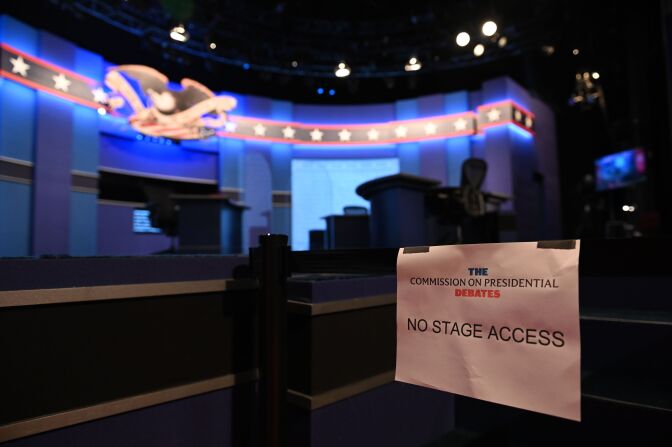Today on AirTalk, we talk about presidential debates and whether they benefit any of its viewers. Also on the show, we break down what is at stake in the Los Angeles' District attorney race; talk to dads about their relationship with their children during COVID-19; and more.
As President Trump Says No To Virtual Debate, We Want To Know: What Do You Get Out Of Watching Live Political Debates?
President Donald Trump said Thursday he would skip next week’s debate with Democratic nominee Joe Biden after organizers said it would be held virtually because of health concerns, further disrupting the president’s efforts to shift focus away from a virus that has killed more than 210,000 Americans this year.
The nonpartisan Commission on Presidential Debates made the decision to shift to a virtual debate unilaterally, citing the need to “to protect the health and safety of all involved with the second presidential debate.” Some staffers associated with producing the debate raised safety concerns after Trump tested positive for the virus following his first faceoff with Biden last week, according to a person familiar with the matter. But Trump, who is recovering from COVID-19 at the White House after spending three days in the hospital, insisted he’s in “great shape” and called the virtual debate a “joke.” Biden’s campaign said they were prepared to move forward. This raises a lot of questions about how potential debates will proceed.
Trading barbs through plexiglass shields, Republican Mike Pence and Democrat Kamala Harris met for the only vice presidential debate of 2020 Wednesday night, but both candidates steered away from direct questions from the moderator. It makes you wonder, what are viewers really getting out of watching or listening to these live debates?
Today on AirTalk we discuss the debates, but we also want to hear from listeners. What do you get out of the debates? Do you watch for style and composure? Do you actually learn about policy stances? We want to hear about it. Join the conversation by calling 866-893-5722.
With files from the Associated Press
Guests:
Annie Linskey, national political reporter focused on the 2020 presidential campaign for The Washington Post; she tweets
Aaron Kall, director of debate at the University of Michigan; he tweets
Los Angeles’ District Attorney Race: Latest Updates, What’s At Stake & More
For Los Angeles voters, there’s a heated race on their November ballot— and we’re not talking about the presidential one.
Incumbent District Attorney Jackie Lacey, who is backed by local law enforcement, is facing a challenge to her bid for a third term by former San Francisco District Attorney George Gascón. After a summer of protest following the police killings of George Floyd and Breonna Taylor, Los Angeles’ D.A. race is coming at a time when many American municipalities are facing pressure to adopt more reformist stances on criminal justice.
Jackie Lacey has faced criticism by Black Lives Matter activists who believe she is hesitant to charge police officers in killings, and George Gascón has also faced some scrutiny of his record. But Gascón’s history of using restorative justice programs over incarceration for nonviolent offenders has brought him political support from progressive leaders, inducing Senator Bernie Sanders of Vermont. Most recently, L.A. Mayor Eric Garcetti came out in support of Gascón, as did California Governor Gavin Newsom.
Ahead of a KPCC/ LA Times co-moderated debate tonight between the two candidates, we are getting the latest on the D.A. race. What’s at stake? And how will the two candidates’ visions shape criminal justice in Los Angeles? To share your thoughts, give us a call at 866-893-5722.
KPCC/LAist Public Safety Correspondent Frank Stoltze and L.A. Times Criminal Justice Reporter James Queally will moderate a virtual debate between the two candidates for District Attorney tonight from 6:30pm-7:30pm. To learn more and RSVP, click here.
Guests:
Frank Stoltze, KPCC correspondent who covers criminal justice and public safety issues; he tweets
Fernando Guerra, professor of political science and Chicano/Latino studies and director of the Center for the Study of Los Angeles at Loyola Marymount University; member of the KPCC Board of Trustees
Zev Yaroslavsky, director of the Los Angeles Initiative at UCLA’s Luskin School of Public Affairs; he is a former member of the Los Angeles County Board of Supervisors (1994-2014) and a former member of the Los Angeles City Council (1975-1994); he tweets
How Have Dads Utilized Extra Time With Their Kids During Lockdown?
How have dads adjusted to working from home while sharing your child’s learning environment or play area? Have your responsibilities within your household changed since lockdown began? What moments of lockdown with your children have been memorable?
Today on AirTalk, we want to hear how dads in our audience have capitalized on making memories and spending more time with their kids during the pandemic. Tell us about it by calling 866-893-5722.
12 Props, 1 Hour: AirTalk Ballot Cram Session
Californians will be deciding on the fate of twelve ballot propositions this year. And there are some biggies, including whether we should allow affirmative action in higher education, whether some cash bail should be replaced by a risk assessment system and whether Uber and Lyft drivers should be classified as independent contractors.
Haven’t studied up yet? Well, get your notepads and pencils ready—it’s time for a one-hour cram session.
Larry Mantle and a panel of expert guests walk you through the basics of the props: what they are, the pros and cons and what’s at stake.
Guests:
Marisa Lagos, political correspondent for the San Francisco-based NPR affiliate KQED and co-host of the podcast “Political Breakdown"
Laurel Rosenhall, reporter covering California politics for CalMatters
Fernando Guerra, professor of political science and Chicana/o Latina/o Studies and Director of the Center for the Study of Los Angeles at Loyola Marymount University
Michael Shires, associate dean and associate professor at Pepperdine University's School of Public Policy




